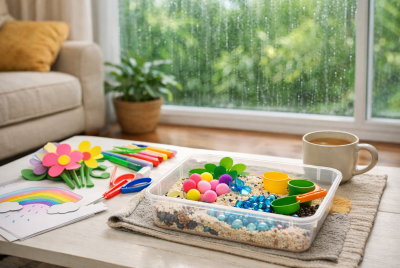Parenting Elementary Kids: Insights and Advice for Every Parent
We may earn a commission for purchases made using our links. Please see our disclosure to learn more.
Parenting elementary kids is like creating the foundation for a masterpiece. These are crucial years for developing resilience, values, and character in addition to academic performance. Let’s talk about how you can help your children navigate this wonderful stage of life.
Understanding the Elementary Age Group
The elementary school years are such a special period. Children, typically aged 6 to 12, are inquisitive, active, and ready to explore. They still require a lot of direction, but they are beginning to discover who they are. Consider them to be tiny sponges that absorb everything in their environment. Giving them the support they require is much easier when you understand what makes this stage unique.
Fostering a Love for Learning
Learning should be an adventure that takes place everywhere, not only in the classroom. Do you want to pique their interest? Try completing science experiments at home, reading stories together, or even making cookies while slipping in a little math. Children begin to view studying as something to love rather than merely a chore when it is entertaining and interesting.
Encouraging Independence
Encouraging children to become self-sufficient is revolutionary. Start simply by letting them choose their own clothes, bring their school bag, or handle little issues. They may make mistakes from time to time, but that’s where the magic happens. Every setback gives them an opportunity to grow, and every accomplishment gives them more self-assurance.
Building Strong Communication
Having quality conversations with your child is more important than quantity. Try having genuine conversations rather than lecturing. Pay close attention to what they have to say about their day. Children are more inclined to talk about their challenges, aspirations, and everything in between when they feel heard.
Managing Screen Time
Screens are both a boon and a bane, let’s face it. Overuse of screens can stifle creativity and social skills, even though some apps and shows can be excellent educational resources. Establish rules, such as no electronics at supper, and promote outdoor play or drawing. It’s all about balance.
Navigating Friendships
Elementary friendships can be complicated, can’t they? One day they’re inseparable, the next day there’s drama. Teach your child to be kind and empathetic, but also to stand their ground when needed. Remind them it’s okay to have just a few close friends rather than a huge circle.
Supporting Academic Success
Grades are important, but they’re not everything. Celebrate the effort your child puts into their work, not just the outcome. Help them set small, achievable goals and create a study space that’s free from distractions. When they see you value their hard work, they’ll stay motivated.
Instilling Discipline and Responsibility
Discipline isn’t about being the bad guy; it’s about teaching. Be clear about your expectations and consistent with consequences. Encourage your child to own up to their actions, whether good or bad. This helps them understand that every choice has a ripple effect, which is a powerful lesson for life.
Encouraging Creativity
Every kid has a spark of creativity, and it’s your job to fan the flames. Whether it’s drawing, building with Legos, or making up stories, give them the tools to express themselves. Creativity isn’t just about art; it’s about problem-solving and thinking outside the box. Who knows? You might have a little inventor or storyteller on your hands.
Teaching Life Skills
Life skills are the building blocks of independence. Start with simple things like making a sandwich, managing an allowance, or cleaning up their room. These tasks might seem small, but they add up to a sense of responsibility and self-reliance. And let’s be real—it’s nice when they can make their own lunch!
Cultivating Emotional Intelligence
Big emotions in little bodies can be a lot to handle. Help your child name their feelings and find healthy ways to express them. Teach empathy by encouraging them to think about how others might feel in different situations. Emotional intelligence is like a superpower that’ll serve them for the rest of their lives.
Prioritizing Health and Nutrition
A healthy kid is a happy kid. Make sure they’re eating balanced meals, getting plenty of sleep, and staying active. Family walks or bike rides can double as quality time. And don’t forget to hydrate—water makes a big difference in their energy and focus.
Promoting a Growth Mindset
Ever hear your child say, “I can’t do it”? Flip that to “I can’t do it yet.” A growth mindset teaches kids that skills and abilities can improve with effort. Celebrate their progress and remind them that mistakes are just stepping stones. It’s all about seeing challenges as opportunities.
Maintaining a Routine
Kids thrive on routines—it’s like their anchor in a busy world. Consistent meal times, homework slots, and bedtime rituals create a sense of stability. And hey, it helps you keep your sanity too! A predictable routine makes life smoother for everyone.
Celebrating Milestones
Don’t let achievements go unnoticed, no matter how small. Whether it’s learning to tie their shoes or acing a spelling test, celebrate their hard work. A simple high-five or a special dessert can make their day. These little moments build self-esteem and keep them motivated.
Handling Tantrums and Meltdowns
Yes, even older kids have meltdowns—and that’s okay. Stay calm, acknowledge their feelings, and guide them through it. Once they’ve cooled down, talk about what happened and brainstorm better ways to handle tough emotions next time. These moments can teach resilience and problem-solving.
Encouraging a Love for Reading
Books are like magic doors to new worlds. Make reading part of your daily routine, whether it’s a bedtime story or a quiet moment with their favorite book. Take trips to the library and let them pick what excites them. A love for reading opens up endless possibilities.
Strengthening Family Bonds
You don’t need fancy outings to connect as a family. Cook dinner together, play a game, or just chat about your day. These simple moments create strong bonds and lasting memories. When your child feels secure in your family, they’re better equipped to face the world.
Preparing for Challenges
Life isn’t always smooth sailing, and that’s a lesson worth teaching. Share your own stories of overcoming obstacles and let your child see how you handled tough times. Encourage them to face challenges head-on, knowing you’re there to support them. Resilience is a gift that lasts a lifetime.
Teaching Gratitude
Gratitude has a way of making life brighter. Encourage your child to notice and appreciate the good things, whether it’s a sunny day or a kind gesture. Practicing gratitude together can shift their perspective from what they lack to what they have. It’s a simple habit that brings joy.
Keeping the Joy Alive
Parenting isn’t about perfection; it’s about finding the joy in the journey. Laugh at the silly moments, embrace the chaos, and celebrate the wins—big or small. Your love and guidance are shaping a future filled with potential. So, take a deep breath and enjoy the ride.
The Role of Parental Involvement in Elementary Education
Parental involvement plays a pivotal role in shaping a child’s academic and personal success during the elementary years. Research from the Harvard Graduate School of Education reveals that children in grades K–3 with actively involved parents develop stronger work habits and a better orientation toward tasks, leading to enhanced academic outcomes. However, a study from Stanford University cautions against excessive involvement, which may hinder a child’s ability to manage attention and emotions independently. Striking the right balance allows parents to support their child’s learning journey while fostering autonomy and resilience.
Must-Have Products for Parenting Elementary Kids
Equipping yourself with the right tools can make parenting elementary kids easier and more enjoyable. Here are some fantastic products available on Amazon that cater to the needs of both parents and kids:
- Melissa & Doug Responsibility Chart
This magnetic chore chart is a game-changer for teaching responsibility. It allows kids to track their tasks, from making their bed to completing homework, and gives them a sense of accomplishment with each star earned. - KidKraft Study Desk with Chair
Create a dedicated workspace for your child with the KidKraft Study Desk. It’s designed with storage compartments for books and supplies, promoting organization and focus. - Bentgo Kids Lunch Box
Say goodbye to lunchtime mess with the Bentgo Kids Lunch Box. This leak-proof, durable container features multiple compartments to keep meals organized and fresh, making it perfect for school lunches. - Crayola Inspiration Art Case
Encourage creativity with the Crayola Inspiration Art Case. Packed with crayons, markers, and colored pencils, it’s an excellent tool for kids to explore their artistic side, whether at home or on the go. - Hatch Rest Baby & Kids Sound Machine
A good night’s sleep is crucial for growing minds. The Hatch Rest combines a sound machine, night light, and time-to-rise clock, helping kids fall asleep faster and stay asleep longer.
These products are practical, high-quality, and designed to support your child’s development while making your parenting journey smoother.
FAQs About Parenting Elementary Kids
- How can I help my child develop good study habits? Create a quiet and organized study space, set a consistent schedule, and encourage short breaks. Praise effort to keep them motivated.
- What’s the best way to handle sibling rivalry? Teach conflict resolution skills, ensure each child feels valued, and promote teamwork through shared activities.
- How much screen time is appropriate for elementary kids? Limit recreational screen time to 1-2 hours per day and prioritize educational content and physical activity.
- How can I boost my child’s self-esteem? Focus on their strengths, celebrate efforts and achievements, and encourage them to try new activities.
- What if my child struggles to make friends? Encourage participation in group activities, role-play social scenarios, and teach them to approach others with kindness and confidence.
Parenting elementary kids is an adventure—a mix of challenges, joy, and endless learning. With love, patience, and a sprinkle of humor, you’ll guide them to become their best selves. You’ve got this!




